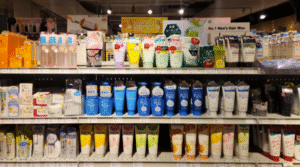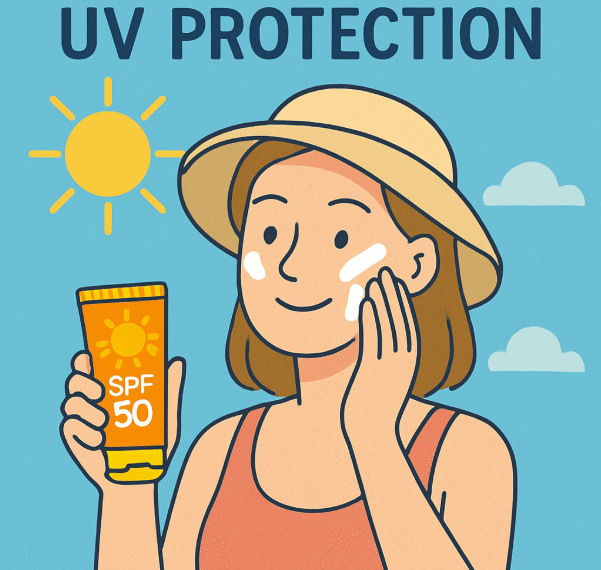In recent years, the importance of skin care has surged, with a particular focus on the role of sunscreen in skin cancer prevention. The growing awareness of the harmful effects of ultraviolet (UV) radiation has driven a significant increase in the demand for effective sun protection products. This burgeoning interest in skin health is also influenced by a broader cultural shift towards wellness and self-care, prompting individuals to be more vigilant about their sun exposure. In this article, we will delve into the science of SPF, the benefits of sunscreen, and how these elements play a crucial role in reducing skin cancer risks.
Sun Protection Factor, or SPF, is a measure of how well a sunscreen can protect skin from UVB rays, the kind of radiation that causes sunburn and contributes to skin cancer. Understanding SPF is essential for selecting the right sunscreen for your needs. An informed choice can not only protect against immediate sunburn but also reduce long-term risks of skin damage and cancer. As skin care routines become more sophisticated, comprehension of SPF levels becomes crucial in tailoring personal protection strategies.
What Does SPF Mean?
The SPF number indicates how long you can stay in the sun without getting sunburned. For example, if it takes 10 minutes for your skin to start turning red without protection, using an SPF 30 sunscreen theoretically allows you to stay in the sun 30 times longer, or 300 minutes, without burning. This theoretical protection time underscores the importance of applying sunscreen correctly and generously; a thin application may not provide the full SPF protection labeled on the product.
However, this is not a guarantee and can vary depending on skin type, intensity of sunlight, and frequency of reapplication. It’s important to note that SPF only measures protection from UVB rays and not UVA rays, which also contribute to skin cancer and premature aging. UVA rays penetrate the skin more deeply and are associated with skin aging and DNA damage, making it critical to use a broad-spectrum sunscreen that offers comprehensive coverage against both types of rays.
Choosing the Right SPF
When selecting a sunscreen, consider your skin type, the length of time you plan to be in the sun, and the activities you’ll be doing. Dermatologists generally recommend using a broad-spectrum sunscreen with at least SPF 30, as it protects against both UVA and UVB rays. This recommendation is based on extensive research showing that SPF 30 can block 97% of UVB rays, offering a solid foundation for daily sun protection.
For those with fair skin or a history of skin cancer, a higher SPF may be advisable. Additionally, water-resistant formulas are beneficial for those who will be swimming or sweating. The choice of formulation—whether lotion, spray, or stick—should also be influenced by personal preference and the specific needs of your lifestyle, ensuring that sun protection is both effective and convenient.

Sunscreen Benefits: More Than Just Sunburn Prevention
Sunscreen is a powerful tool in skin cancer prevention, but its benefits extend beyond just preventing sunburn. Regular use of sunscreen can significantly reduce the risk of developing skin cancer, including melanoma, which is the deadliest form of skin cancer. By creating a barrier that minimizes UV penetration, sunscreen not only protects against cancer but also serves as a vital component of overall skin health, contributing to a more youthful and resilient complexion.
Protecting Against Skin Cancer
Skin cancer is the most common cancer in the United States, and its incidence is rising. According to the Skin Cancer Foundation, using sunscreen daily can reduce the risk of developing melanoma by 50%. This statistic underscores the importance of integrating sunscreen into daily routines, not just during summer or beach outings. Consistent use of sunscreen can act as a formidable defense against the cumulative effects of UV exposure, which can manifest as various forms of skin cancer over time.
Incorporating sunscreen into everyday life requires a mindful approach to application, ensuring that all exposed areas are covered. The habit of applying sunscreen should be as routine as brushing teeth, emphasizing the necessity of reapplication every two hours, or more frequently if swimming or sweating.
Preventing Premature Aging
In addition to protecting against skin cancer, sunscreen also helps prevent signs of premature aging, such as wrinkles, fine lines, and age spots. UV radiation is a major contributor to skin aging, and regular sunscreen use can help maintain a youthful appearance. By blocking the harmful effects of UV rays, sunscreen preserves the skin’s collagen and elasticity, which are essential for a smooth and firm complexion.
The anti-aging benefits of sunscreen are further enhanced when combined with other protective measures, such as wearing sunglasses and hats, which shield delicate areas around the eyes and face. Sunscreen with added antioxidants can offer even greater protection by neutralizing free radicals that contribute to skin damage.
Enhancing Skin Health
Sunscreen helps maintain overall skin health by preventing sun-induced damage. This preservation of skin integrity allows for better moisture retention, a smoother texture, and fewer blemishes and irritations. By acting as a physical shield, sunscreen reduces the risk of inflammatory reactions and supports the skin’s natural repair processes.
The use of sunscreen is also beneficial in managing conditions like rosacea and hyperpigmentation, where UV exposure can exacerbate symptoms. By incorporating sunscreen into a comprehensive skincare routine, individuals can enjoy healthier, more resilient skin that is better equipped to withstand environmental stressors.
Skin Cancer Prevention Strategies
While sunscreen is a crucial component of skin cancer prevention, it is not the only measure one should take. Implementing a comprehensive sun protection strategy is vital for minimizing risks. This holistic approach considers various factors, including lifestyle, skin type, and environmental conditions, to create an effective defense against UV exposure.
Seek Shade and Wear Protective Clothing
Avoiding direct sun exposure, especially during peak hours from 10 a.m. to 4 p.m., is an effective way to reduce UV radiation exposure. When outside, seek shade or wear protective clothing, such as hats, sunglasses, and long-sleeved shirts. These physical barriers provide an additional layer of protection, reducing reliance solely on sunscreen and offering consistent coverage throughout the day.
Investing in clothing with built-in UV protection can enhance sun safety, especially for those who spend extended periods outdoors. Fabrics with a high Ultraviolet Protection Factor (UPF) can block both UVA and UVB rays, complementing the protective effects of sunscreen and ensuring comprehensive coverage.
Regular Skin Examinations
Perform regular self-examinations to check for any changes in moles or new skin growths. Early detection of skin changes can lead to earlier diagnosis and more effective treatment of skin cancer. Self-examinations should be thorough, covering all areas of the body, and any suspicious changes should be evaluated by a healthcare professional promptly.
Regular visits to a dermatologist for professional skin checks are also recommended, particularly for those with a history of skin cancer or increased risk factors. These examinations can identify potential issues before they become serious, emphasizing the importance of proactive skin monitoring.
Educate and Advocate
Educating oneself and others about the importance of sun protection and skin cancer prevention is crucial. Advocacy for sun-safe behaviors can lead to broader cultural shifts towards better skin health practices. By sharing knowledge and encouraging sun protection habits, individuals can contribute to a community-wide commitment to reducing skin cancer risks.
Public health campaigns and community programs play a vital role in raising awareness about the dangers of UV exposure. Supporting initiatives that promote sun safety in schools, workplaces, and public spaces can have a lasting impact on societal attitudes towards sun protection.
The Evolving Landscape of Sun Care Products

by Zoshua Colah (https://unsplash.com/@zoshuacolah)
As the wellness industry evolves, so do the products designed to meet consumer needs. Understanding these trends is key for wellness product developers, lifestyle magazine editors, and health and wellness coaches. The growing diversity in sunscreen formulations reflects a broader trend towards personalized and holistic approaches to health and well-being.
Innovations in Sunscreen Formulation
Consumers are increasingly seeking products that offer not only UV protection but also additional skin benefits, such as hydration, anti-aging properties, and suitability for sensitive skin. Manufacturers are responding with innovative formulations that cater to these demands. From mineral-based sunscreens that provide a gentle alternative for sensitive skin to formulations enriched with vitamins and antioxidants, the range of options is expanding rapidly.
The development of advanced delivery systems, such as microencapsulation and time-release technologies, is also enhancing the efficacy and convenience of sunscreen products. These innovations ensure longer-lasting protection and improved user experience, aligning with consumer preferences for multifunctional skincare solutions.
Eco-Friendly and Sustainable Options
Environmental consciousness is influencing consumer preferences, leading to a demand for eco-friendly and reef-safe sunscreens. These products do not contain harmful chemicals, such as oxybenzone and octinoxate, which can damage coral reefs. The shift towards sustainable sun care solutions reflects a growing awareness of the environmental impact of personal care products and a commitment to preserving natural ecosystems.
Manufacturers are exploring biodegradable packaging and renewable ingredients to minimize the environmental footprint of their products. This commitment to sustainability is resonating with consumers who prioritize ethical and environmentally responsible choices in their purchasing decisions.
Personalized Sun Care Solutions
Advancements in technology are paving the way for personalized sun care solutions. Products tailored to individual skin types, UV exposure levels, and lifestyle preferences are becoming more accessible, offering consumers a more customized approach to sun protection. Personalized recommendations based on digital skin assessments and mobile apps that track UV exposure are empowering individuals to make informed decisions about their sun care routines.
These technological innovations are not only enhancing the effectiveness of sun protection strategies but also fostering a deeper understanding of personal skin health. By leveraging data and personalization, consumers can achieve optimal protection tailored to their unique needs and circumstances.
Conclusion
Understanding SPF and its role in skin cancer prevention is vital for anyone committed to maintaining healthy skin. By choosing the right sunscreen and integrating it into a comprehensive sun protection strategy, individuals can significantly reduce their risk of skin cancer while enjoying the numerous benefits of sun-safe practices. This proactive approach to skin care not only safeguards health but also enhances overall quality of life by preventing the visible and invisible impacts of UV damage.
As the wellness landscape continues to evolve, staying informed about the latest trends and innovations in sun care products will enable stakeholders to better meet consumer needs and promote healthier lifestyles. Embrace the power of sunscreen and take proactive steps towards a safer, more sun-conscious future. By doing so, we can collectively contribute to a culture that values and prioritizes the long-term health and vitality of our skin.




